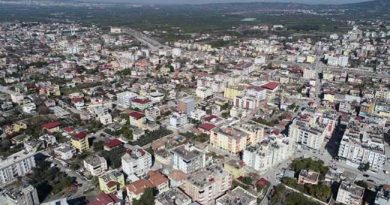What will change in Turkey? Important details in new constitution proposal of Six-Party Table

The proposal for constitutional amendment which the CHP, DEVA Party, Democratic Party, Future Party, IYI Party and Felicity Party have agreed on, have been announced. The proposal of the Six Party Table consists of 84 articles. Here are the headlines that stand out
The CHP, DEVA Party, Democratic Party, Future Party, GOOD Party and Felicity Party announced the constitutional amendment proposals they agreed on for the transition to a strengthened parliamentary system in Ankara.
The leaders of the Six Party Table, “Kemal Kılıçdaroğlu, Ali Babacan, Gültekin Uysal, Ahmet Davutoğlu, Meral Akşener and Temel Karamollaoğlu” attended the meeting. At the meeting held in BILKENT in Ankara, the constitutional proposal was introduced by top executives of the group.
The members of the commission who prepared the bill will visit media outlets, bar associations, non-governmental organizations, professional organizations, the business world, trade unions, women’s and youth organizations in the coming days. In addition, six political parties will organize joint programs throughout Turkey and come together with civil society.
PRESIDENT WILL END HIS/HER RELATIONSHIP WITH HIS/HER PARTY
The president will be elected by the people for a term of 7 years, and with the election, his/her relationship with his/her party will end. A president whose term of office has ended will not be able to assume a political office that comes with the election. The President will be deputized by the Speaker of the Grand National Assembly. The president’s coercive veto effect on laws is ended and the right to send them back is given.
PARTY CLOSURE WILL BE MADE DIFFICULT
It will be made difficult to open political party closure cases. In order to open party closure cases, except for resorting to violence or inciting violence, a warning condition is being introduced. The opening of the closure case is linked to the permission to be taken with the vote of two-thirds of the Parliament. It is regulated that the statements used by MPs on the parliamentary bench cannot be evidence in party closure cases. Administrative fines are added to the sanctions that may arise from these cases.
BOARD OF JUDGES AND PROSECUTORS (HSK) WILL BE CLOSED
The Board of Judges and Prosecutors is being closed and the Board of Judges and the Board of Prosecutors are being established. In order to ensure the independence of the judiciary, the Minister of Justice and his deputy will cease to be members of the Board of Judges.
GOVERNMENT WILL NOT BE BROUGHT DOWN UNTIL A NEW ONE IS ESTABLISHED
The authority to issue a no-confidence vote on the government, the prime minister and ministers is being established. With this innovation, it is mandatory to add the name of the new Prime Minister to the motions of no confidence against the Council of Ministers. Thus, the parliament, as a requirement of stability, will only be able to bring down the current government if it can unite in forming a new government.
THE “STATE OF EMERGENCY DECREES” WILL BE ABOLISHED
The State of Emergency decrees are being abolished. It is regulated that measures related to States of Emergency will be regulated by the State of Emergency Law, and the judicial route cannot be closed against administrative actions and transactions arising from the State of Emergency Law and this law.
COURT OF ACCOUNTS AND SUPREME ELECTORAL COURT WILL BE SUPREME COURT
The Court of Accounts is being restored to the status of the Supreme Court. The scope of the audit authority of the institution is being expanded. The Supreme Electoral Council (YSK) is organized in the Constitution as a supreme court in the judicial department and the nature of the council is clarified. The decisions of the Supreme Electoral Council on the right to vote, to be elected and to engage in political activity are subject to the supervision of the Constitutional Court.
SEPARATION OF POWERS WILL BE ESTABLISHED
The new system, which emphasizes the separation of powers, aims to ensure that the legislature is effective and participatory, the execution is stable, transparent and accountable, and the judiciary is independent and impartial. In the agreed text it says, “We are determined to build a strong, libertarian, democratic and fair system.”
LIBERTARIAN UNDERSTANDING OF THE CONSTITUTION
The proposal of the table of six purifies the Constitution from the understanding that emphasizes fundamental rights as “homework” and limits freedoms to the concept of homework. The Constitution is given a libertarian understanding. Traces of authoritarian understanding are being erased from the Constitution. In the Constitution, “fundamental rights and freedoms” are regulated instead of “fundamental rights and duties”.
HUMAN DIGNITY WILL BE THE BASIC PRINCIPLE
The expression “Human dignity is inviolable and is the basis of the constitutional order” is added to the first article of the Constitution regulating fundamental rights. With this emphasis, it is ensured that the Constitution gains a perspective based on human dignity. It is emphasized that the main function of the state is to protect human dignity and respect it.
IN CASE OF HESITATION, EVALUATION TO BE MADE IN FAVOR OF FREEDOM
The provision “Freedom is essential, limitation is exception. In case of hesitation, the evaluation is made in favor of freedom” is added to provision 13 of the constitution. Thus, one can see a transition from the idea of limiting fundamental rights and freedoms to the period of supremacy of fundamental rights and freedoms.
FREEDOM OF CRITICISM WILL BE GUARANTEED
Freedom of thought, opinion and expression is regulated in a single article. Freedom of criticism is guaranteed with the amendment to be made in provision 25 of the constitution. Arbitrary limitations are prevented.
ANIMAL RIGHTS WILL BE INCLUDED IN THE CONSTITUTION FOR THE FIRST TIME
While the right to health and the right to the environment are reorganized with the amendment made to article 56 in the Constitution, animal rights are constitutionally guaranteed for the first time.
LIFTING IMMUNITY WILL BE MADE MORE DIFFICULT
It is regulated that deputies cannot benefit from immunity only in the cases of being caught red-handed, entering the duty of the high criminal court. The reference made in provision 83 of the Constitution to provision 14 is removed from the text. It is stipulated that a decision will be taken with an absolute majority of the full number of members for the lifting of immunity. If the individual application path has been taken in the decision to drop the deputy, it is arranged that the decision of the Constitutional Court will be awaited.
THOSE FOUND GUILTY OF VIOLENCE AGAINST WOMEN WILL NOT BE ABLE TO BECOME DEPUTIES
The provision is introduced that those convicted of sexual assault, sexual abuse of children, intentional wounding of women and engaging fraud will not be eligible to be elected as a deputy, even if they have been pardoned.
THE SCOPE OF INDIVIDUAL APPLICATION TO THE CONSTITUTIONAL COURT WILL BE EXPANDED
The number of members of the Constitutional Court is being increased from 15 to 22. It is foreseen that 20 of the members will be elected by the Parliament and 2 by the president. The number of sections of the court is being increased from 2 to 4. An individual application to the Constitutional Court is being opened for the alleged violation of the rights regulated in the Constitution or the European Convention on Human Rights.
THE NATIONAL ASSEMBLY WILL HAVE THE AUTHORITY TO BUDGET
The budget authority is being returned to the Parliament. In order to ensure that governments carry out their policies in accordance with the limits of the Budget Law, the Final Account is regulated in a separate article in the Constitution. According to the amendment, a Definitive Accounting Commission is being established and its chairman is required to be a deputy of the main opposition party.
THE DEFENSE AND PROSECUTION WILL BE EQUALIZED
Geographical guarantees are introduced to judges and prosecutors. The independence of the defense is emphasized. The defense authority, which is one of the basic elements of the trial process, is regulated for the first time by a constitutional provision, ensuring that this authority is given an equal status with the prosecution authority. It is clearly regulated in the Constitution that there will be a bar association in each province.
RTÜK MEMBERS WILL CONSIST OF JOURNALISTS AND ACADEMICS
Pluralism is ensured in the membership structure of the Supreme Council of Radio and Television. RTÜK (Supreme Council of Radio and Television) members will be selected from among the members of the press, communication and faculty of law. A qualified majority in the Turkish Grand National Assembly is required in the election of members. It is emphasized that the Board will work in accordance with the principles of pluralism, autonomy and impartiality.
THE INTERIOR MINISTER WILL NOT BE ABLE TO DISMISS MAYORS
The Council of State will decide on the removal of mayors from office: The power of the Ministry of Internal Affairs to suspend mayors and councilors from office is being abolished. Instead, the Council of State decision is imposed. It is regulated that the suspension from the post can last a maximum of six months.
HIGHER EDUCATION BOARD (YÖK) TO BE ABOLISHED
The Higher Education Board is being abolished. The Supreme Council of Higher Education, which will be the planning and coordination board, is being organized provided that the academic, administrative and financial autonomy of universities are not violated.





